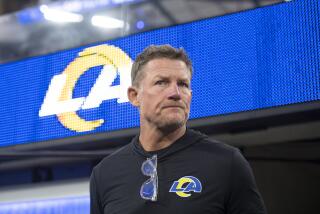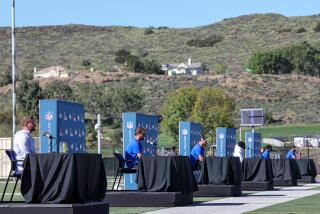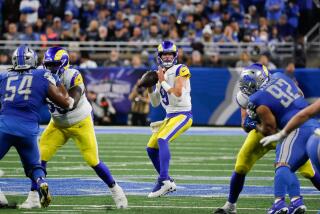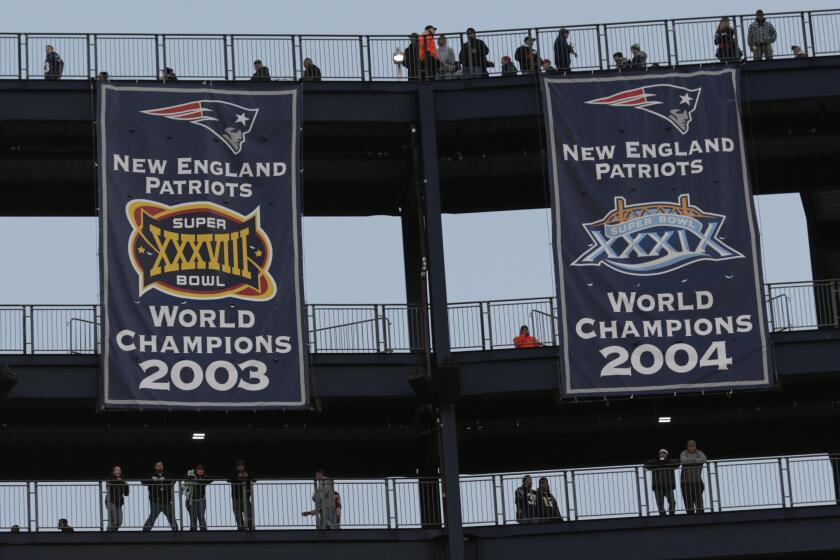Cracking the code: Kevin Demoff helps Rams find their way back to L.A.
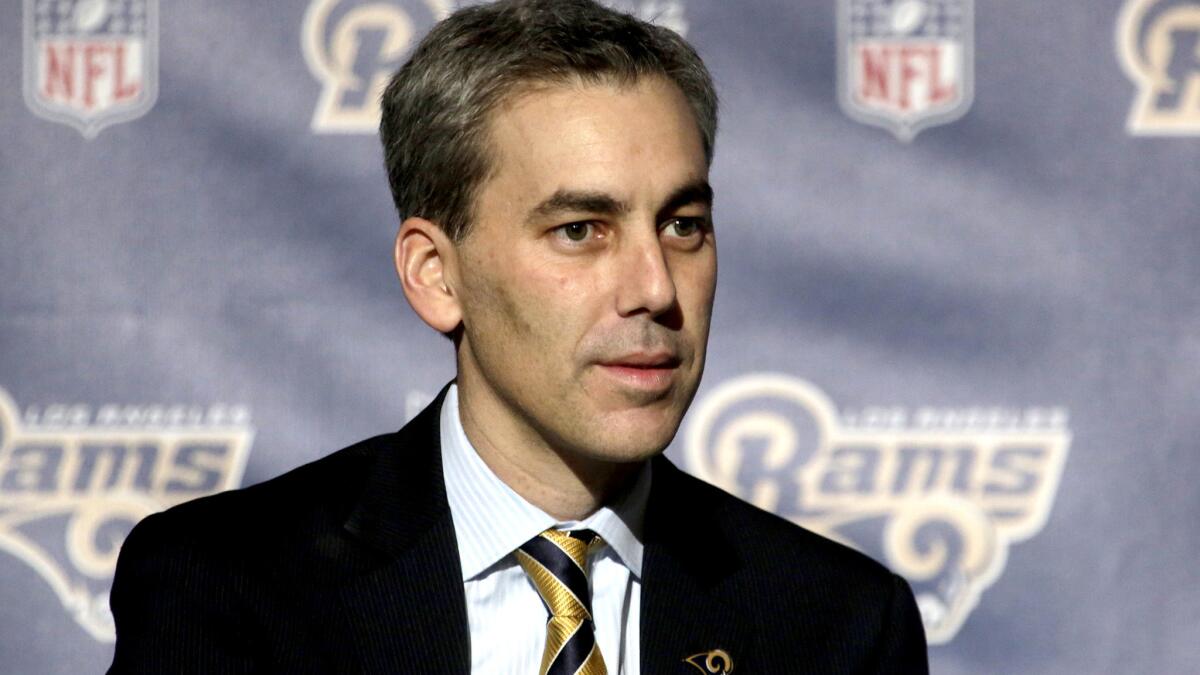
All Kevin Demoff wanted to do was get on with the basketball game. But everyone else on the court was frozen in place, transfixed by the familiar, hulking man in the stands. It was Miami Dolphins quarterback Dan Marino, who had slipped into the gymnasium of the small school in Brentwood to watch Kevin, the fourth-grade son of his agent, try his hand at point guard.
“The other nine kids on the court were just staring at Dan,” Demoff recalled. “And I’m like, ‘Hey, we’ve got a game to win here.’ I didn’t even think about it.”
As the football world would learn decades later, Demoff is unruffled by the big stage. The Rams’ top executive, whose childhood was steeped in pro football, was an integral figure in untangling the most confounding knot in professional sports. Demoff, 39, was key in bringing the NFL back to Los Angeles for the first time in 22 years.
It was Rams owner Stan Kroenke who had the resources and vision for a transformational stadium project at Hollywood Park, but Demoff was the point guard when it came to selling that Inglewood concept to the rest of the league.
“I’m fortunate to have the tutelage of Stan, who has really pioneered how you combine resources and sports in a way that has never been done before,” said Demoff, the Rams’ executive vice president of football operations and chief operating officer. “I’m grateful for his mentorship. He pushes our team for greatness and challenges us to envision the impossible.”
In January, what once was impossible became a reality. By a 30-2 vote, NFL owners chose the Inglewood project over a competing plan in Carson jointly backed by the San Diego Chargers and Oakland Raiders.
“In my 45 years in the movie business, I’ve heard some very exciting pitches for movies,” said Steve Tisch, co-owner of the New York Giants and an Oscar-winning film producer. “Kevin’s pitch for the Rams’ new stadium at Hollywood Park was just as powerful. He was passionate, informative, prepared and dynamic. … It was like watching a great trailer for a movie.”
The rail-thin Demoff, who seemed to grow grayer by the day, was under intense pressure in recent years as he fought the stadium battles in St. Louis and navigated a new path in Los Angeles, where so many others had tried and failed to get football venues built.
Many Rams fans in St. Louis revile Demoff, accusing him of being an architect of a deception. They argue Kroenke was determined to relocate the team to Los Angeles, and only paid lip service, by way of Demoff, to staying in St. Louis.
I became fascinated with the elements of managing a team and how it worked.
— Kevin Demoff, Rams executive vice president of football operations and chief operating officer
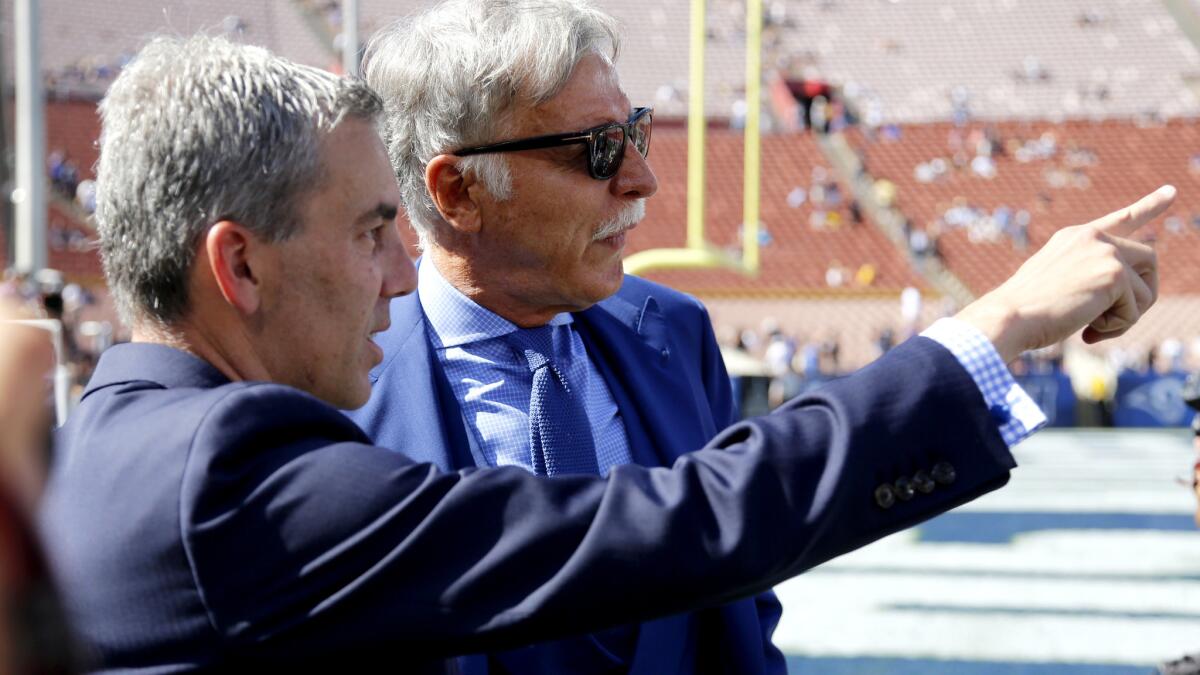
Demoff said suspicions surfaced even before arbitrators ruled in favor of the Rams in early 2013, paving the way for the team to get out of its lease two years later.
“When you work at a team, your job is to build an emotional connection with the fan base,” Demoff said. “The [St. Louis] stadium situation always gave reason for fans to not completely commit to you. Because in the back, deep part of their minds, there were stadium issues that were unresolved. And even worse, it was a city that had lost a team before.”
In the summer of 2014, when Kroenke took control of the 300 acres at Hollywood Park, the prospect of a move back to Southern California became more real.
“Now you had a site that the NFL had long coveted, an owner with the expertise and resources to do it the way the NFL had always wanted to do it, and a team that had the right to relocate,” Demoff said.
“Even then, the best project and opportunity in Los Angeles never guaranteed success. No one had figured out this Rubik’s Cube for so long.”
Problem-solving is in Demoff’s DNA. His father, a former public defender, soared to the top of the sports-representation business by finding creative ways to structure contracts when other agents might fall back on boilerplate solutions.
“He’s creative, he’s patient, he’s fair,” Kevin said of his father. “Ultimately, he just listens, reasons, comes up with solutions. He was always trying to look for a win-win.”
Marvin and Patti Demoff still live in the same Benedict Canyon home where they raised their two children, Kevin and Allison. Before the age of cellphones, the family had four land lines and a fax line, as Marvin liked to be home for dinner and would work there into the night.
Sometimes, Kevin would quietly pick up a phone and eavesdrop on his dad’s negotiations. Other times, he’d sit near his dad and try to imagine what was being said on the other end of the line.
“You’re a kid; you’re always thinking about how you can get one over on your parents,” he said. “That’s your job in life. So I spent a lot of time thinking about how I could negotiate against my father. What would I say? That’s what I basically spent a lot of my childhood doing.”
Marvin, 73, had an all-world stable of clients that included Marino, John Elway, Shannon Sharpe, Junior Seau, Jonathan Ogden and Tim Brown, and Rams such as Jack Youngblood and Jim Everett.
Years ago, the NFL draft started on a Thursday at 5 a.m. on the West Coast and lasted into the night. That was like a holiday in the Demoff household.
“What I loved about the draft was I got to skip that morning of school,” Kevin said. “I had to go to school when the first round was over. So I would always hope for the really long first round with lots of trades. We used to bring in bagels and donuts at 4:30 in the morning, sit in the den in our pajamas and watch.”
Kevin was 6 in 1983, when his dad represented both No. 1 pick Elway and No. 27 Marino. That was the best draft ever for quarterbacks. But what Kevin remembers is another of his father’s clients, running back Curt Warner, watching on TV from their house. After being selected third overall by the Seahawks, he and Kevin spent the rest of the morning shooting baskets.
Although Kevin religiously followed lots of sports, he was partial to football. At 10, he’d spend hours reading football magazines and devising mock drafts. He and his dad were in an early fantasy football league, too, with teams printed on big spreadsheets and scored by hand. They played against lawyers at his dad’s firm, and ran circles around them. One season, he was a ball boy for the Chargers, a club he would later go head-to-head against in the acrimonious stadium derby.
“I became fascinated with the elements of managing a team and how it worked,” he said.
When he went to college at Dartmouth, however, he did not envision working for a team or being an agent. He wanted to be a sportswriter. He was sports editor at the school’s paper, and called games on the college radio station.
Upon graduating, he went to work for a start-up Internet company that eventually got into the business of designing websites for teams. One of his pitches was to the Oakland Raiders, where he met team executive Bruce Allen.
Around that time, Casey Wasserman was starting the Arena Football League’s Los Angeles Avengers, and needed someone to run the personnel side. He called Allen for staffing advice, and Allen suggested he reach out to Demoff, who was 23 at the time. Wasserman, then 24, wound up hiring him.
“What Kevin and I realized is that, if you go and work for an NFL team, you don’t really have a massive impact as a young kid,” Wasserman said. “You only learn what they want you to learn. In the Arena League, we were all in, all responsible for all of it. That was our PhD in sports.”
Demoff said that was his opportunity to learn the team side of the business “and make a ton of mistakes without anybody ever seeing them.”
After four years, he was ready to take the next step.
“Ultimately, I decided I didn’t want my life decided on whether a ball bounced off a net or a post, or went into the stands, and that it was time to grow a skill set,” he said.
Demoff decided to return to business school at Dartmouth, but not before Allen offered him a front-office job with the Tampa Bay Buccaneers, where he had rejoined former Raiders coach Jon Gruden.
Demoff considered going to the NFL, but eventually opted for graduate school. “Why don’t you do both?” Allen said, and brought him on as an unpaid intern. He would send projects to Demoff at Dartmouth, then bring him down for the Senior Bowl, scouting combine and training camp.
“Kevin grew up the same way as I did,” said Allen, son of Hall of Fame coach George Allen. “It was from a slightly different perspective, but he had the same understanding of the game, the league, the players and the coaches, because of not only Marvin’s presence in the league but his domination of the league.”
The day after Demoff graduated, he was with the Buccaneers as a full-time employee, and he and his wife, Jenn, set up shop in Tampa. While living there, they would have their daughter, Claire.
A few years later, they would move to St. Louis, where Kevin took a job with the Rams, and Jenn had their son, Owen. Demoff was in his early 30s and running an NFL franchise.
“I’m not naive,” he said. “I got a lot of opportunities in my life and football because of my last name, and I’m grateful for that. I didn’t deserve the Avengers job when I got it. I didn’t deserve the Rams job when I got it. Both were taking leaps of faith on me based on my father and what he’d done, and somewhat based on my career. You hope from there you can go earn it.”
In January, at a Houston hotel, Demoff delivered his final presentation of Kroenke’s vision to the rest of the NFL owners. After a series of votes, Inglewood beat Carson in a landslide, and the Rams were given the green light to return to Los Angeles. Since, the Rams moved, traded up for the No. 1 pick and helped secure a Super Bowl for Inglewood at the end of the 2020 season.
“It’s surreal,” said Patti Demoff, a college counselor. “They’re here, but it almost feels like an out-of-body experience. I have to keep reminding myself the Rams aren’t just here visiting.”
Both of his parents point to the fact that Demoff was a history major at Dartmouth, with an emphasis in art history. They said his creative side allows him to look at problems from many different angles, and to see solutions others might miss.
“What it allowed him to do is really get Stan’s vision and be able to explain it to others,” Marvin said. “When he showed you a picture of what Inglewood is going to look like, he could see the art form, the vision, and be passionate about that vision the way people would be passionate about a piece of art.”
Of course, with the Demoffs, it all comes down to the art of the deal. Father and son will be on the opposite sides of the table in the coming days as they hammer out details of an expected contract extension for Rams Coach Jeff Fisher, represented by Marvin.
“It’s like playing chess or checkers against yourself,” Kevin said. “Our styles are so similar, you focus on the same things. So you always wind up in a draw or stalemate. I can always tell when we’ve reached the logical conclusion of a negotiation, because I’ll say, ‘Do you have any other solutions?’ and he says, ‘No . . . but I raised you better than this.’”
Marvin has a picture on his desk from Patti’s 40th birthday party in 1987. It’s of the family, grouped together at the Hollywood Park finish line. A great memory. Kevin has already planned an updated shot to go with it: the family, much larger now, standing at midfield of the new stadium when it opens in 2019 — a different kind of finish line.
Twitter: @LATimesfarmer
ALSO
Rams roster remains a work in progress, as team continues to maneuver
A new NFL season means a new game of quarterback musical chairs
Veteran linebacker Akeem Ayers among players cut by Rams
More to Read
Go beyond the scoreboard
Get the latest on L.A.'s teams in the daily Sports Report newsletter.
You may occasionally receive promotional content from the Los Angeles Times.
